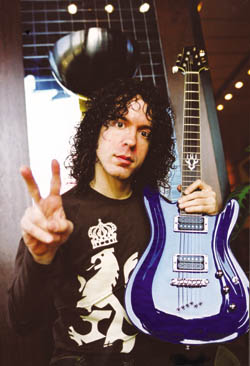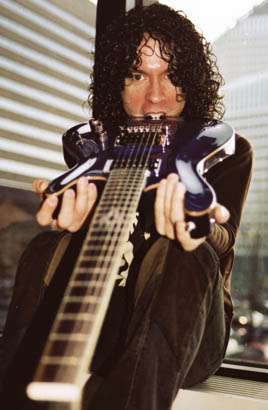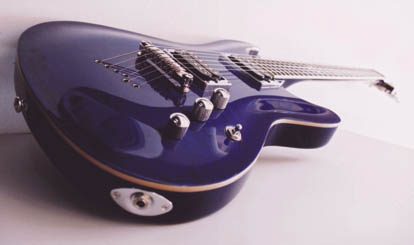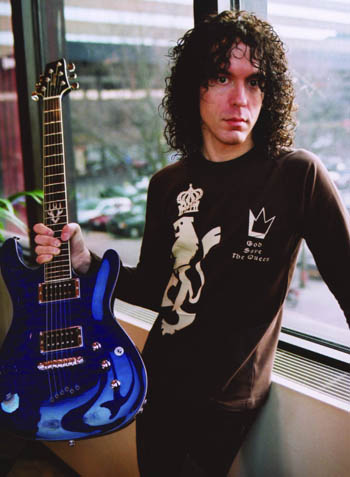This interview was done on wednesday, march 12, 2003. Marty has just released his new album ‘Music For Speeding’ and was touring Holland and doing some promo activities and gigs.
A shorter version of this interview was printed in the Music Maker may 2003 guitar special issue.
Copyright Richard Hallebeek and Music Maker 2003. Copying or use elsewhere striclty prohibited. Thank you Petra Guijt for the pictures! And special thanks to Bert Viel for getting all of Marty’s material out the me in time and by doing so making this interview possible.
:: Let’s dive into your past a bit. You started out playing with Jason Becker in the 80’s. How did you meet him?
‘We met because I was doing a solo record and as I was doing it, Mark Varney said: you should check out this guitar player, ’cause he’s really good and really young. The day that I met him we became really good friends and I knew that I wanted to be in a band with him. Instead of doing a solo record I decided to form a band with Jason and make a record together called ‘Cacaphony’. That’s pretty much how we met.’
:: That was some real groundbreaking stuff in the 80’s. You were on of the first to glue classical and rock together in a special way.
‘Thank you very much, it was a lot of fun, too.’
:: How was it to be playing together at that time? Did you feel like you were on top of something or something special was happening at that time?
‘I think that we were just trying to do something fresh, really. And we were just trying to do something that we have never heard done before and make it something that nobody else could really do. We were really concerned about being the only one to do what we were doing, that’s were we shot at.’
:: Did you have any role models at that time?
‘Not really at all, really. We didn’t really like the other people who were, you know, the guitar heroe kinda guys we kinda didn’t really go for that kinda music too much. We were just trying to make eachother do better, you know. And try to grow as a band, that kinda thing.’
:: Are you still in touch with Jason?
‘Yeah, as a matter of fact. I’m pretty much eh… you know I try to help out when there’s a tribute or like what I did last year on new year’s I played a symphony. I played Jason’s music in San Fransisco with a symphony. That was a really great experience. Jason came out to the show and it was really cool.’
:: How is he doing nowadays?
‘Well, it’s pretty much the same. If you’re familiar with what he’s dealing with it’s very tough kind of situation. But he’s got such a great spirit that he doesn’t even complain despite how hard it is. That’s amazing.’
:: Is he still composing?
‘No, he’s not.’
:: Not able to do that.
‘No he’s not able to do that. Hopefully he will be able to do that again someday.’
:: I read alot about why you left Megadeth so I don’t want to dive into that again. But what’s like like after being in such a huge act for a long time?
‘Well, after Megadeth I took some time and I wrote some music that I felt was cool and I thought was fun and fresh and basically spent a lot of time learning how to record it properly myself. Instead of doing it all with other engineers. I engineered about 80% of the record myself.’
:: I understood you’ve invited some bands into your studio to learn a bit about the recording process.
‘Yeah, that was great. I let them record for free while I was learning how to record you know. So it was really helpful for everybody.’
:: What was the most important thing you’ve learned about being a recording engineer?
‘That I fucking hate it! (laughs) I really hate it. I love being able to do stuff myself, but it takes so much away from the actual creative process..that..it doesn’t really take away from it, it just makes things take longer. I don’t know if I was born to be an engineer but it’s good to know how to do it. But it’s not something I think I would do for fun.’
:: What’s in your studio, analog or digital?
‘Both. Mostly digital though.’
:: Probably protools..
‘It’s similar to protools, it’s Digital Performer. I recorded my drums as analog and mixed in Pro Tools and I did all the tracking in Digital Performer. Kind of mixed up. But it was a lot of fun actually, but really hard work since I did almost everything. But I had a really good support team behind me, great people mixed the record and.. they really kinda saved me. I just kind of recorded it any ‘ole way I wanted to and I let the professional guys deal with it and sort everything out in the mixes.’
:: I’m curious about such a huge band as Megadeth, how do you approach your solos in a group like that? Is that worked out stuff or was there any room for improvisation?
‘It was half and half really, I mean, if i felt like improvising, I would improvise. Sometimes I would hear a melody, if I heard the song and I heard the vocal line, automatically a melody would come into my mind and then I would just try to work off that melody and really work it out and make something that, you know, takes a little bit of time, but at the end it’s a really strong melody. Sometimes when you improvise, it’s just like, you do a lot of flashy stuff, but…sometimes when you work out stuff it really..it pays to work something out and the end product is really stronger because you worked something out.’
:: What about playing live with Megadeth? You play those same melodies or was there any room to stretch?
‘Yeah, as a matter of fact, I was very, very strong about playing the same thing live as I did in the studio, ’cause as a fan myself, I really like to see the guys play, I mean, that’s what I came to see, I didn’t come to see the guy mess around and try to..you know.. try do something better then what’s on the record. If I’m gonna buy the record I want it to be the best that it can possibly be. You know what I’m saying? I think the record should be the thing that you leave in history and then when you play live, I’m gonna try to play it as close to what it was on the record. I’ve always been that way.’
:: But what about the band? If you play these huge shows, was there any room to stretch?
‘Well, in Megadeth one of the things I didn’t like about it was, it was really kind of narrow. I mean it was just straight ahead heavy metal all the time and there really wasn’t a lot of place for, you know, experimentation and there weren’t a lot of different textures in it, is what I’m trying to say. And.. I kinda like a little bit more of a challenge in the recording process and playing live. I like more sounds then just, you know, distorted guitars and loud drums. I like a little bit more dynamics. And so, that’s kinda like one of the main reasons why I wound up leaving, it’s just because there was a lack of variety in what we were doing. But that said, I think we were doing great at what we did. What we had was a great product of great sound and it was really cool. It just wasn’t really enough to like, do it for more ten years, you know what’s I’m saying?’
:: Yeah. Megadeth was one of the tightest bands out there. You guys sounded really, really tight.
‘Yeah we were tight! It’s like eating a great, great steak dinner every single night, it’s wonderful, but every night for ten years can get a little bit tired.’
:: How did you guys work on getting that tight sound?
‘The secret to getting it tight was that we were very, very strong musicians. I mean, I think all of us were capable of a lot more then what you actually saw or what you actually heard. We were very kind of..very confident musicians and we worked our asses off, you know. We were always prepared to do everything and..we did a lot of like, really hard working during the making of the record. I mean, before a song is done we probably played the thing a thousand times every different possible way. So by the time it’s recorded we already know the thing so well and we’re playing it in our sleep.. because we’ve gone through so many different versions of the song before it got finished that we were very confident playing that kind of stuff. That’s the good side of it. The bad side of it is like you don’t really get like fresh improvisation when you play something a 5000 times. Before you release it. So there’s good and bad. But I think we were one of the tightest band in rock. But that’s the same reason why it was kinda hard to keep it fresh all the time. We knew the stuff so well that..how can you be excited about something that you’ve played a thousand times before you’ve played it even once live, you know? So, good sides and bad sides. Mostly good though.’
:: So you guys must have practiced all the time with that band?
‘I wouldn’t say practise. I’d say that we developed the songs very, very intensely before they were recorded. For months.’
:: Let’s get a bit into your guitarplaying. Your soloing style uses a lot of exotic scale-type sounds. How did you develop an ear for that? Maybe because you grew up living in Hawaii?
‘Well, it’s really part from learning from other cultures’ music, really. Once I started learning how to play guitar.. and getting kind of decent at it, all my friends and all the other guitarplayers were like studying all these other good guitarists and stuff and learning from the same guitar players and… I didn’t wanna do the same things as my friends were doing, I just wanted to learn from something totally different. So I learned from foreign instruments, you know, like Chinese instruments and Japanese and Indian.. and all kinds of instruments and it really made my playing sound a little bit different.’
:: Do you have any names for those scales you’re using or do you just go by ear?
‘Those aren’t really scales what I’m playing, it’s really just a different way of playing melody, melodic phrases and stuff. There’s not a lot of scale playing in my guitar playing. If you analyzed it, it’s a lot of phrases that are kind off based on foreign instruments. They’re not common to the guitar, that’s why they sound kind of exotic. But you can’t really just say it’s this scale or that scale.’
:: You left Jackson guitars and went to Ibanez.
‘That’s correct.’
:: A lot of players like Gambale and Petrucci left Ibanez because they felt they could not get done what they wanted to get done at Ibanez. So, why Ibanez?
‘Well, that’s the same reason why I left Jackson really because the guitar couldn’t do what I needed it to do, you know. I needed a guitar that was gonna give me more than just straight up heavy metal. Ibanez has that covered pretty good plus they can give you a wonderful variety of clean tones and really heavy dark tones, too. More colors then Jackson. Jackson is probably one of the best heavy metal guitars in the world if not the best. But I needed something that did a little bit more.’
:: What is your current setup like, crate amps?
‘Yeah, I use Crate amps and I also use Roland VG-88 multi FX unit with the synth pick up in the guitar.’
:: That’s cool, I’ve been using the VG system for almost ten years now and I don’t eat, sleep or play without it.
‘oh dude! You gotta get the version 2.0 upgrade..!’
:: I just had it installed last week. It’s friggin’ great!
‘How do you like that nylon string sound?
Great sound. I also like the new sitar. The wave synth is my favorite. ‘Yeah, I love those and I love that nylon string guitar sound in there. That’s the biggest thing ever.’
:: That’s good to hear, you’re a VG-addict, too
‘Oh, I think that’s the way for the future, I think amps are getting phased out. And synths are much easier to manage.’
:: Any other sounds you’re using from the VG?
‘Well, I just got mine like about a month ago and I’ve been doing some seminars with it and doing promotion for my new record with it. But I don’t really know to much of the sounds, you know, besides the ones that I use. But I like everything that I’ve heard, the presets are great.’
:: I think you have to tweak the heavy distorted tones a bit to get a nice solo sound, but the presets are a good starting point.
‘Very, very good starting point.Very good.’
:: Guitar playing-wise, do you go through some practise routine before you start recording or before you start playing live to get yourself warmed up and in the mood?
‘No, not really, I mean ,I just work on the material and that’s pretty much enough. And I’m playing so much guitar all the time that I would never, ever have any time to practise. I think every time you pick up the guitar, that’s practise in some way.’
:: Your new album ‘Music For Speeding’ is out and there’s some hip stuff happening with sampling and hip sounds.
‘Thank you.’
:: How did you accomplish that?
‘Yeah, I did a whole lot of sequencing and programming and a lot of that kinda stuff on this record. Much more then ever before. I really got into learning how to do that over the last year. And it’s just fun, it tastes really good if you know what I mean, and with guitar, it just feels really good.’
:: What kind of programs did you use?
‘I used Nemesis Gigastudio and I used a Roland Groove Box.’
:: A software plug-in version of the groove box?
‘No, I used the actual groove box’
:: Is that the older one or the newest?
‘Eeehm.. MC 505, I believe’
:: OK, that’s the older one but has some killer sounds.
Just a few more random questions..I read you lived really close here once, in Germany. ‘Yes, I sure did, I lived in Germany for like.. three years. I loved it, it was great to make friends with people from a different culture.’
:: Why did you decide to move there?
‘Oh, I was a little kid and my dad got transferred there with his work.’
:: Ah.. I understand, so that was a long time ago.
‘Yeah, yeah.’
:: Is there anything else you would like to share with us?
‘Well, I’m just very glad to talk to you and I’m glad that you liked the record and.. I hope everybody else can enjoy it. I think, for me, it’s like the freshest thing that I’ve ever recorded with the most fun guitar stuff ever. I’m really proud of the record and I’m happy that the reaction in Europe has been so good, because Europe is usually tough on my records. (laughs)”
:: Oh really, are they?
‘Yeah! But it’s great, I’ve just been over there and I did 75 interviews in ten days, the reaction has been wonderful, and I’m very, very pleased that you like the record as well.’



